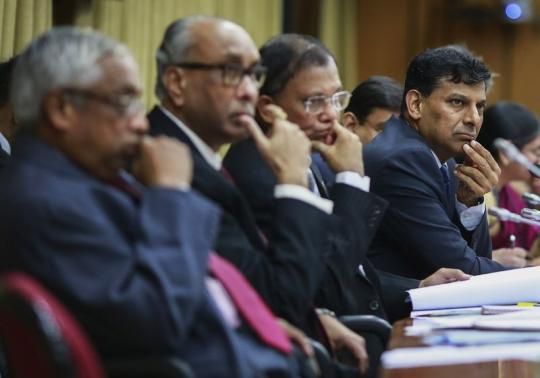The recently released policy review statement of the Reserve Bank of India (RBI) is all about expectations, says Rathin Roy.

It is explicit about inflationary expectations and asserts that should inflationary expectations be revised downwards, a change in monetary policy stance - namely, some lowering of the policy repo rate - can be expected early next year. However, it is clear that the RBI also has implicit expectations from the government.
The review signals that the RBI's monetary policy stance and its assessment of the state of India's economy are contingent on these expectations being realised.
There are three macroeconomic variables that impact the RBI's expectations: growth, inflation and the current account balance.
On growth, the RBI reads the contemporary situation thus: agriculture growth in the current fiscal year is likely to be muted.
The growth picture for services is mixed. Industrial growth is still way too low to contribute to a sustained a non-trivial increase in gross domestic product (GDP) growth.
Most important, the report asserts that "the still slow pace of reviving stalled projects, despite government efforts, warrants policy priority". The RBI, thus, takes the view that little has as yet changed materially on the growth front.
This leads the RBI to conclude that any reduction in the policy repo rate would have largely "signaling effects". A cut would positively impact "animal spirits" and market sentiments, and, therefore, potentially spur growth-enhancing activities. However, the real effect of an interest rate cut is to lower the cost of funds and thereby to stimulate investment and growth.
This is not expected to be large, as the RBI's identification of the principal bottleneck concurs with mine - there are institutional and supply-side bottlenecks to both domestic and foreign investment that need to be overcome before investment demand responds directly to lower cost of capital.
A cut in interest rates will make Mumbai more cheerful and keep the stock market happy, but it will have limited real economy effects.
For these to kick in, the pace of reforms must accelerate.
It is only after reforms deliver the expected growth dividend that it becomes analytically meaningful to draw inverse correlations between the policy repo rate and incremental economic activity. On inflation, the RBI has expectations about government fiscal policy.
It sees the fiscal outlook as uncertain, and is sceptical about the quality of eventual fiscal adjustment.
This is a reasonable reading based on current facts.
The most recent medium-term fiscal policy statement continues to plan for the government to borrow to consume, with privileged first access to domestic savings.
There have been gloomy reports about shortfalls in tax revenue targets.
There is little concrete happening on expenditure control in the immediate present, other than the ceremonial, low-credibility circulars on austerity routinely issued by the department of expenditure.
On disinvestment, there is accelerated activity, but receipts of the magnitude forecast in the last Budget are not expected to accrue to the treasury before the end of the current fiscal year.
In any case, fiscal credibility will not be enhanced if disinvestment proceeds are used to finance government consumption expenditure.
The review asserts that "the government ... appears determined to stay on course". But staying on course, would, like changes in the repo rate, only send out good vibes.
The kind of structural changes that need to be made to fiscal-policy design and execution have yet to happen; until they do, the outlook is not materially different from six months ago. Hence, no abatement in inflationary pressures can be expected from a central government that is borrowing largely to consume.
The RBI expects change, presumably commencing in the next Budget, but must hold its current view until this actually happens.
This is a reasonable stance for the present. It is equally reasonable for the RBI to have optimistic expectations about the future.
Falling oil prices, some improvement in the export situation and a well-managed currency are all noted as cause for optimism.
The government has embarked upon a slew of important structural reforms.
It has begun to dismantle some of the stifling institutional architecture that has made doing business in India so difficult.
It has committed to a monetary policy framework, a comprehensive modern Indian financial code and important tax policy reforms.
Disinvestment actions have commenced.
The first concrete recommendations of the expenditure management commission should be implemented in the next Budget.
So a lot is happening in the present continuous tense.
However, getting the economy into a position where it is structurally capable of delivering sustained high growth with moderate inflation and a well-managed external account requires us to move from the present continuous to the present perfect tense.
That can only happen in instalments, and the RBI will, therefore, continue to calibrate its policy stance based not just on how it influences market expectations, but also on how well the government delivers on the expectations the RBI has from it.
Whether, and when, it changes the policy repo rate is of limited economic significance outside this context, unless you are placing short-term bets on the financial markets.
And the governor, clearly, is not a betting man.
Rathin Roy is director, National Institute of Public Finance and Policy.











 © 2025
© 2025